通悟语法系列1:冠词和名词课件(78张PPT)(讲练结合)
文档属性
| 名称 | 通悟语法系列1:冠词和名词课件(78张PPT)(讲练结合) |  | |
| 格式 | ppt | ||
| 文件大小 | 7.6MB | ||
| 资源类型 | 教案 | ||
| 版本资源 | 通用版 | ||
| 科目 | 英语 | ||
| 更新时间 | 2020-08-10 08:54:05 | ||
图片预览

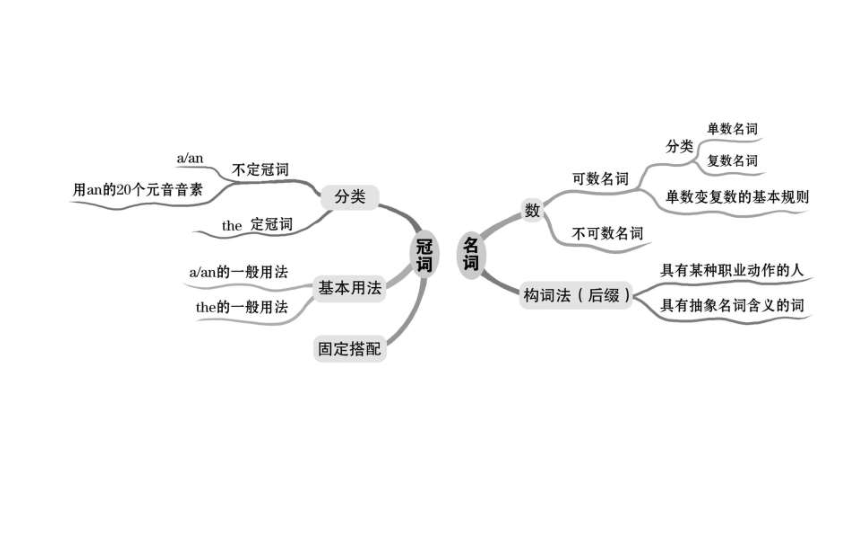
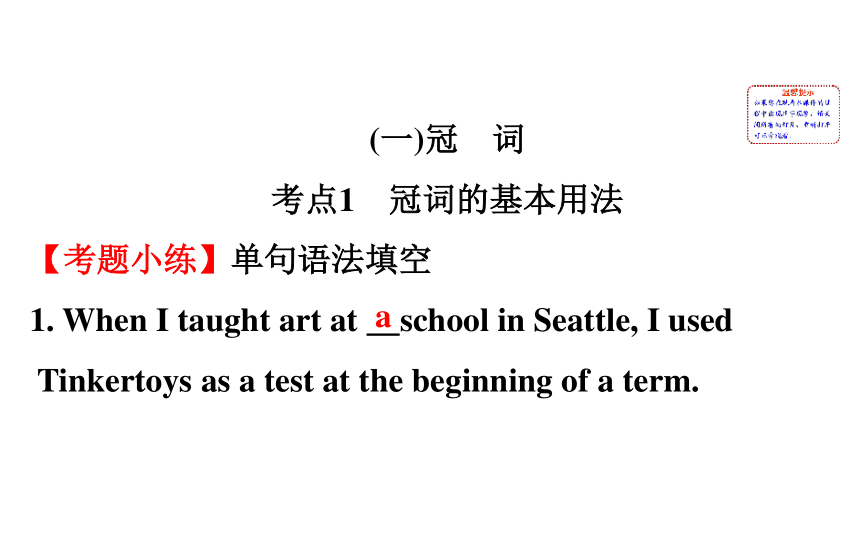

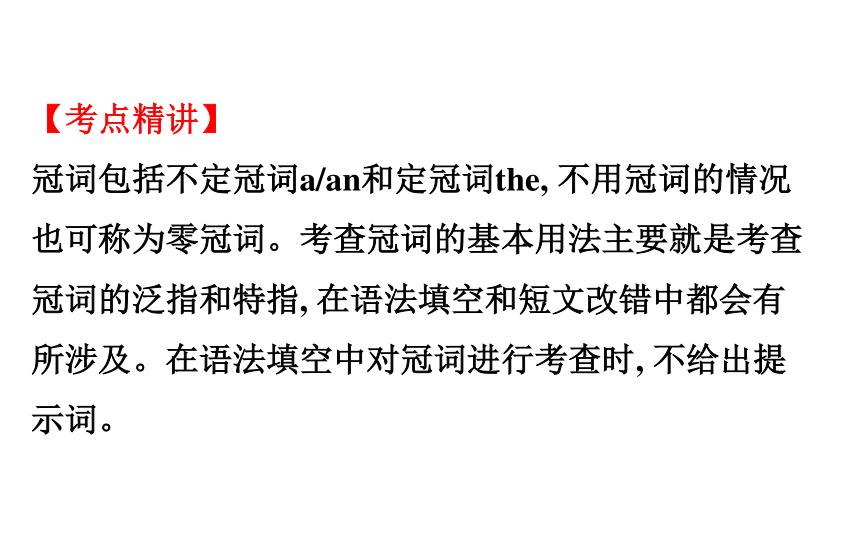
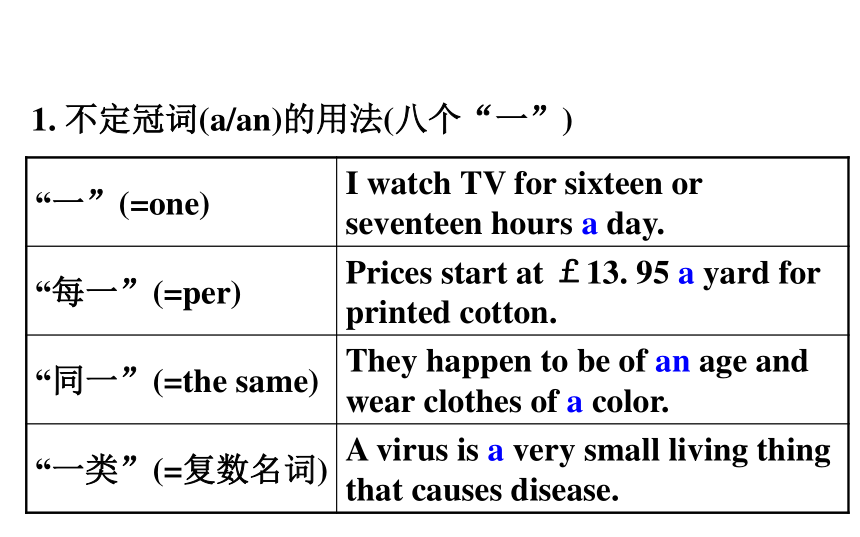
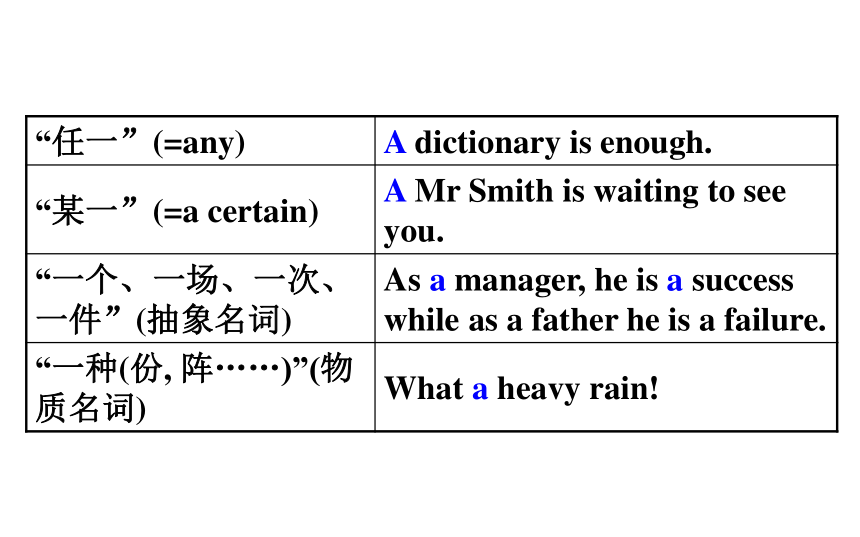
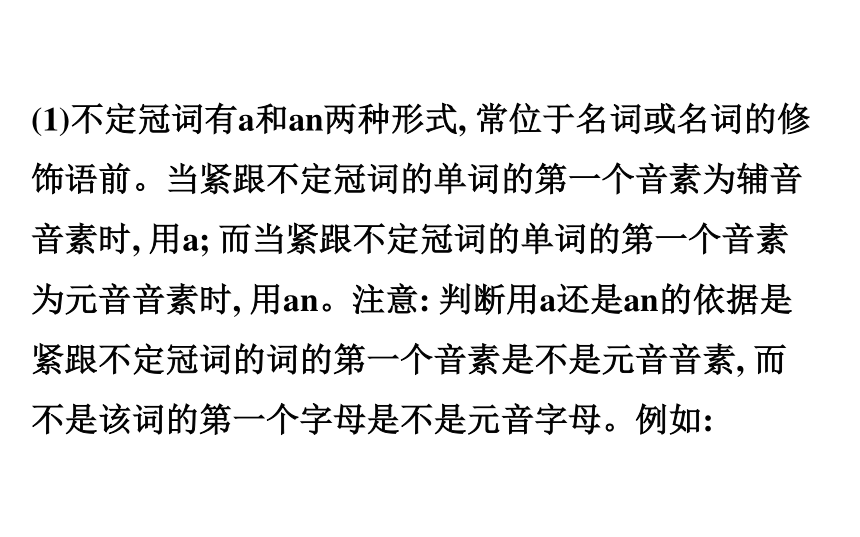
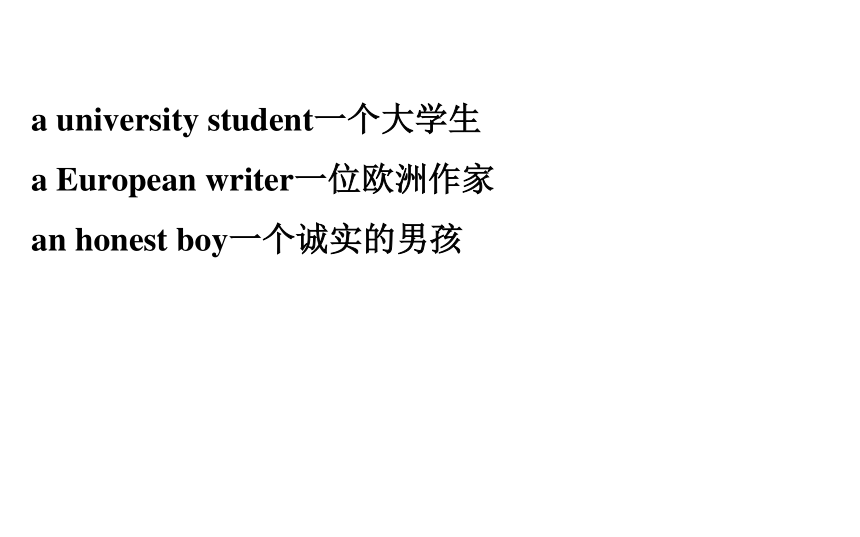
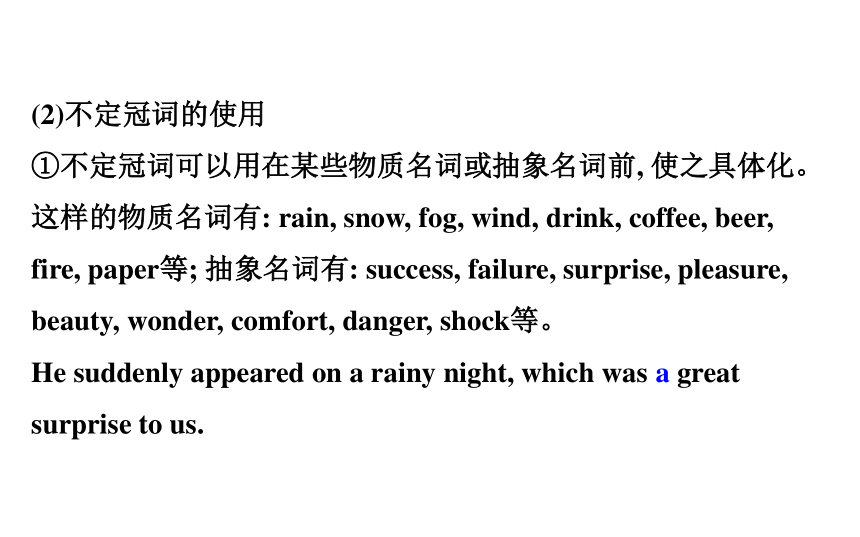
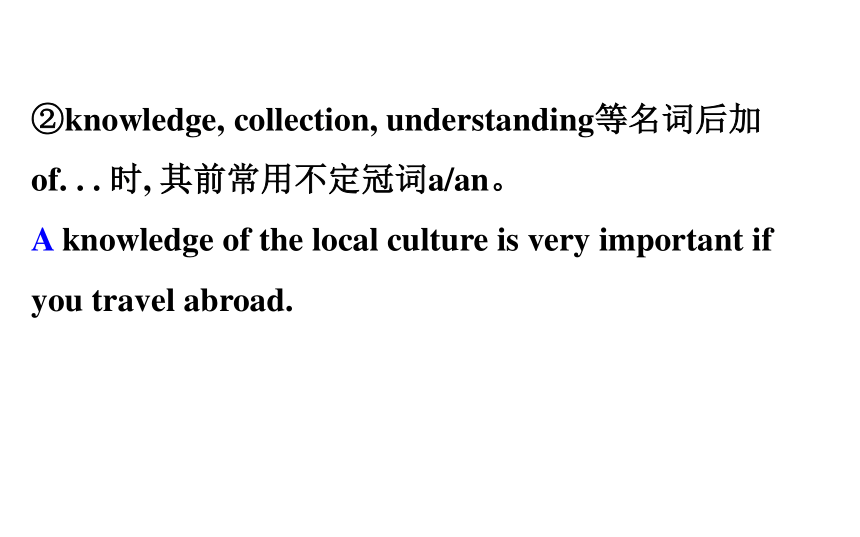
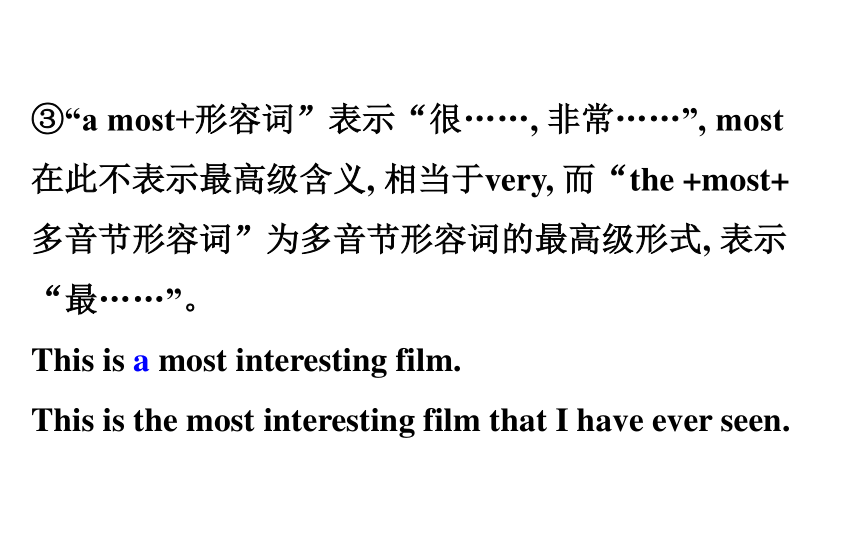
文档简介
第1讲
冠词和名词
(一)冠 词
考点1 冠词的基本用法
【考题小练】单句语法填空
1. When I taught art at __school in Seattle, I used
Tinkertoys as a test at the beginning of a term.
a
2. My parents had moved to England from India
during ___1970s.
3. The frequent terrorism activities in recent years
constitute(构成) ___enormous security challenge to
all countries.
4. The X-rays you get at ___doctor’s or dentist’s are
not enough to cause cancer.
the
an
the
【考点精讲】
冠词包括不定冠词a/an和定冠词the, 不用冠词的情况也可称为零冠词。考查冠词的基本用法主要就是考查冠词的泛指和特指, 在语法填空和短文改错中都会有所涉及。在语法填空中对冠词进行考查时, 不给出提示词。
1. 不定冠词(a/an)的用法(八个“一”)
“一”(=one)
I watch TV for sixteen or seventeen hours a day.
“每一”(=per)
Prices start at £13. 95 a yard for printed cotton.
“同一”(=the same)
They happen to be of an age and wear clothes of a color.
“一类”(=复数名词)
A virus is a very small living thing that causes disease.
“任一”(=any)
A dictionary is enough.
“某一”(=a certain)
A Mr Smith is waiting to see you.
“一个、一场、一次、一件”(抽象名词)
As a manager, he is a success while as a father he is a failure.
“一种(份, 阵……)”(物质名词)
What a heavy rain!
(1)不定冠词有a和an两种形式, 常位于名词或名词的修饰语前。当紧跟不定冠词的单词的第一个音素为辅音音素时, 用a; 而当紧跟不定冠词的单词的第一个音素为元音音素时, 用an。注意: 判断用a还是an的依据是紧跟不定冠词的词的第一个音素是不是元音音素, 而不是该词的第一个字母是不是元音字母。例如:
a university student一个大学生
a European writer一位欧洲作家
an honest boy一个诚实的男孩
(2)不定冠词的使用
①不定冠词可以用在某些物质名词或抽象名词前, 使之具体化。这样的物质名词有: rain, snow, fog, wind, drink, coffee, beer, fire, paper等; 抽象名词有: success, failure, surprise, pleasure, beauty, wonder, comfort, danger, shock等。
He suddenly appeared on a rainy night, which was a great surprise to us.
②knowledge, collection, understanding等名词后加of. . . 时, 其前常用不定冠词a/an。
A knowledge of the local culture is very important if you travel abroad.
③“a most+形容词”表示“很……, 非常……”, most在此不表示最高级含义, 相当于very, 而“the +most+多音节形容词”为多音节形容词的最高级形式, 表示“最……”。
This is a most interesting film.
This is the most interesting film that I have ever seen.
2. 定冠词the的用法
(1)表示特指的人或物, 或者双方都知道的或心中都明白的人或物或者指上文已经提到过的人或物。
*Do you know the man standing at the gate of the door?
(2)用于单数可数名词前, 表示整个类属。
*Alexander Bell invented the telephone in 1876.
(3)用于某些形容词、分词前表示一类人/物或用在姓氏复数前表示一家人。
*The Greens entertained us with dinner the day before yesterday.
(4)用在被短语或从句修饰的名词前表示特指。
The young man is the student who I taught 10 years ago.
(5)表示世界独一无二的事物, 如the moon, the sun, the earth, the universe, the world, the sky等。
*No one knows when the moon came into existence, as it happened so long ago.
【点津】①当这些名词前有修饰语时, 亦可用不定冠词, 如a bright moon, a new world。
②有些事物虽然也是独一无二的, 但习惯上却不用冠词, 如space太空, nature自然, man人类等。
(6)用在序数词、形容词/副词最高级以及形容词only, very, same等前面。
Is this the first time you have visited Beijing?
China is one of the richest countries in natural resources in the world.
That’s the very thing I’ve been looking for.
【点津】当序数词不表示顺序而表示“又一, 再一”时, 用不定冠词, 如a second time意为“再一次; 又一次”。
(7)用于表示方位、西洋乐器等的名词前, 如in the east, in the northwest, play the piano等。
【点津】当乐器类名词表示泛指时, 可以与不定冠词连用。
She is learning to play the piano.
She is playing a borrowed violin.
(8)用于表示某世纪/年代/时期或朝代的名词前。
*It is not rare in the 1990s that people in their fifties are going to university for further education.
(9)用在表示度量单位的名词前, 如by the hour/day/week/month/year/dozen/yard/ton/kilo, 但是size/weight/time这类名词跟by连用时不加冠词。
I hired the car by the hour.
Apples are sold by weight and coal is sold by the ton.
(10)与形容词或副词的比较级连用, 一般用于以下两种情况:
①用于“the+比较级, the+比较级”结构中, 表示“越……, 就越……”之意。
*The more we do for the people, the happier we’ll be.
②用在“the+比较级+of the two”结构中, 表示“两个中较……的一个”。
*She is the taller of the two girls.
(11)在“动词(take/catch/pat/hit/…)+sb. +介词(by/in/on)+the+名词(身体某一部位)”结构中, 名词前要用定冠词the, 而不用物主代词。
The police caught the thief by the arm.
3. 零冠词的用法
(1)专有名词、物质名词、抽象名词、人名、地名等名
词前, 一般不加冠词。
*He is living in Canada now.
(2)表示季节、月份、星期和节日的名词前和学科、语
言、三餐、球类运动、棋类游戏的名词前不用冠词。
*We usually have breakfast at 7 o’clock.
【点津】表示一日三餐等的名词前一般不用冠词。但若指具体的某顿饭或三餐前有形容词修饰时要用冠词。如: have a wonderful supper。
(3)称呼语及表示独一无二的头衔、职务的名词作宾语补足语及同位语时, 不加冠词。
*Dr. Peter Spence, headmaster of the school, told us, “A fifth of pupils here go on to study at Oxford or Cambridge. ”
(4)turn(变成)后的单数名词作表语不用冠词。但名词前若有形容词修饰, 则必须加冠词。
His brother has turned writer.
Later she turned a successful singer.
(5)在as/though引导的部分倒装句中, “零冠词+单数名词+as/though+主语+谓语+主句”, 意为“虽然/尽管……但是……”。
*Hero as he is, he has some shortcomings.
(6)用在“名词+介词短语”的独立主格结构中。
*The teacher came in, book in hand.
【点津】其他几种零冠词的用法
①与by连用的表示交通工具和通讯工具的名词之前不用冠词。
It’s quicker by air than by sea.
I sent the letter by airmail.
②在“表示类型的名词+of. . . ”这一结构中of后的可数名词单数前不用冠词。
This kind of question often appears in the exam.
【题组训练】单句语法填空
1. On __cold Friday night, a poor artist stood at the
gate of the subway station, playing his violin.
a
2. There’s no such thing as living alone. Never mind if
you’re ___only person in your house and have no dog,
no cat, not even fish. 世纪金榜导学号
3. One thing we can do to help solve this problem is to
walk or use __bicycle when possible.
4. Many factors contribute to ___enjoyable experience.
the
a
an
考点2 冠词的固定搭配
【考题小练】
1. Girls, who always spend money on clothes, should
keep ___eye open for discounts.
2. ____number of these results on why this kind of bird
can’t fly are extremely interesting.
an
The
3. Zinio is a platform for digital magazines, with more
than 5, 500 magazines from __wide range of publishers.
a
【考点精讲】
1. 含不定冠词的固定搭配
have a knowledge/understanding of了解
have a good view of饱览 in a hurry匆忙地
as a result因此 as a rule通常
as a whole总体上 as a matter of fact事实上
at a loss不知所措 in a word总之
2. 含定冠词的固定搭配
make the most/best of充分利用 in the end最后
by the way顺便说一下 in the distance在远处
in the way挡道 on the whole总的来说
at the same time同时 on the other hand另一方面
to tell the truth说实话 for the time being暂时
3. 含零冠词的固定搭配
at present目前 take part in参加
in peace平静 by chance/accident碰巧
on purpose故意 on second thoughts再三考虑
ahead of time提前 in advance提前
by law根据法律 by mistake错误地
under repair处于维修中 lose heart灰心
4. 常用的固定词组辨析
【题组训练】单句语法填空
1. Cai, the ofo spokeswoman, said, “Shared bikes could
solve the‘last mile’problem in ___environmentally
friendly way. ” 世纪金榜导学号
an
2. Bike to Work Day is started by the League of
American Bicyclists in 1956 with ___aim of promoting
the bicycle as a serious choice of getting to and from
work.
3. Ambitions, meaning things you want to achieve very
much, play ___important role in our daily life.
the
an
4. The website asks visitors to join in the movement to
reduce ___number of illiterate(不识字的) people in the
world.
the
(二) 名 词
名词按其词汇意义可分为专有名词和普通名词。普通名词包括可数名词和不可数名词。可数名词有单数和复数之分, 不可数名词没有复数形式。
考点1 名词单复数
【考题小练】单句语法填空
1. There are various types of tea that offer different
health _______ (benefit) and flavours.
benefits
2. While there are amazing ______(story) of instant
transformation, for most of us the changes are gradual
and require a lot of effort and work, like cleaning up
a polluted river.
stories
3. I suddenly regretted that we had no ______(photo)
from this vacation together.
4. One spring afternoon, we went to one of the grocery
_____(store)nearby to buy some food for dinner.
photos
stores
【考点精讲】
1. 可数名词变复数的规则变化
可数名词变复数形式时一般在名词后面加-s或-es。变化形式如下表:
构成方法
例词
1
一般在词尾加-s
map→maps, sea→seas.
girl→girls, day→days
2
以-s, -x, -ch, -sh结尾的名词后加-es(stomach除外)
class→classes, box→boxes,
watch→watches, dish→dishes
构成方法
例词
3
以-f或
-fe
结尾的词
变-f或-fe
为-v, 再
加-es
leaf→leaves, knife→knives,
wife→wives, wolf→wolves
加-s
belief→beliefs, chief→chiefs,
proof→proofs, roof→roofs,
gulf→gulfs, safe→safes
2. 可数名词变复数的不规则变化
名词变复数不规则变化的形式如下表:
构成方法
例词
1
增加字母
child→children, ox→oxen
2
改变名词中的元音字母或其他形式
man→men, woman→women,
foot→feet, goose→geese,
mouse→mice
3
单复数同形
sheep, deer, series, means fish, species
构成方法
例词
4
表示
“某国
人”的
名词
加-s
American→Americans, German→Germans, Greek→Greeks
单复数同形
Portuguese, Chinese, Japanese
以-man或-woman结尾的, 将-man和-woman分别改为-men, -women
Englishman→Englishmen
3. 合成名词的单复数变化
合成名词
将主体名词变为复数
son-in-law→sons-in-law,
looker-on→lookers-on,
passer-by→passers-by,
story-teller→story-tellers
无主体名词时通常在最后一个词后加复数词尾
grown-up→grown-ups,
stand-by→stand-bys
“man/woman+名词”构成的合成词变复数时, man/woman和名词均变为复数
woman singer→women singers, man servant→men servants
【题组训练】单句语法填空
1. It is especially effective in getting rid of the bacteria
on your _____(tooth) and keep them healthy!
2. During the 1880s, _______(bicycle) enjoyed a sudden
growth in popularity.
teeth
bicycles
3. But many of us have never considered how our
________(emotion) are affected by what we eat.
4. Built by Emperor Qin Shihuang as a defence against
the _______(enemy) from the North, today, the Great
Wall is China’s symbol to the rest of the world.
世纪金榜导学号
emotions
enemies
5. A bus driver’s main responsibility is safely
transporting __________(passenger).
passengers
考点2 不可数名词
【考题小练】单句语法填空
1. They had both been sentenced to _____(die).
2. The girl then plants a kiss on the grass in a heart-
warming show of ________(affect).
death
affection
3. My __________(apply) was successful and I spent
an enjoyable month learning film-making.
4. Perhaps he can make his _______(fortunate) at
football.
5. I really needed snow, because it was good for my
________(recover).
application
fortune
recovery
【考点精讲】
1. 常见的不可数名词
一般来说, 物质名词和抽象名词是不可数的, 因此没有
复数形式, 一般也不能用a或an修饰。通常只用作不可
数名词的名词有: milk, music, homework, housework,
weather, news, butter, information, bread, advice,
progress, orange(橙汁), equipment, meat, fun, luggage, luck, work(工作), traffic, furniture, wealth, word(消息), room(空间), man(人类)等。
【点津】
①word意为“消息”, room意为“空间”, man意为“人类”时通常不带任何修饰成分。
②不可数名词可以通过在名词前加表示数量的词来表示数量概念。
a piece of paper一张纸/一片纸
two sets of furniture 两套家具
③furniture, equipment, information, advice, progress, weather, fun这七个词为纯粹的不可数名词。
2. 常使用复数形式的单词和短语
①表示由两个相连的类似部分组成的事物的名词只用复数形式, 如: jeans, pants, scissors, compasses, glasses。
②表示问候、祝贺、感谢等的名词常用复数形式, 常见的有regards greetings, respects, wishes, congratulations, thanks等。
③一些固定短语中的名词只用复数形式, 常见的有take turns to do sth. , in high spirits, make friends with, as follows, shake hands with等。
3. 抽象名词的具体化
具有某种特性、状态、情感的抽象名词在表示具体的概念时, 可以与不定冠词连用, 常考到的有:
单词
抽象名词
具体化名词意义
success
成功
成功的人或事
pleasure
乐趣
令人高兴的事
attraction
吸引
有吸引力的人或事物
beauty
美; 美丽
美丽的人或事物
comfort
安慰; 慰藉
令人感到安慰的人或事物
danger
危险
危险的人或因素
delight
高兴
令人高兴的事
failure
失败
失败的人或事物
surprise
惊奇
令人惊奇的事情
shock
震惊
令人震惊的事情
pride
骄傲
令人骄傲的事情
【题组训练】单句语法填空
1. ______________(encourage) can be given at any time,
to anyone, in any situation.
2. —Why do you choose to work in an international
travel agency?
—Well, you know, English is my ________(strong).
So it is my best choice.
Encouragement
strength
3. We gave him some ______(advice) on what to choose.
世纪金榜导学号
4. Our new office is under ___________(construct),
and we are likely to move into it next year.
5. As is known, learning __________(motivate) promotes
students to learn for the purpose of achieving some goals.
advice
construction
motivation
【高考试水区】
1. (2017·全国卷Ⅲ) Instead, she is earning £6, 500 a
day as __model in New York.
2. (2018·全国卷Ⅲ) Unexpectedly, I’m face-to-face with
the gorilla, who begins screaming at ___top of her
lungs.
a
the
3. (2018·全国卷Ⅱ) Corn production has jumped
nearly 125 percent over ___past 25 years, while rice
has increased only 7 percent.
the
4. (2018·全国卷Ⅰ) Two of the authors of the review
also made a study published in 2014 that showed a
mere five to 10 minutes a day of running reduced the
risk of heart disease and early deaths from all
______ (cause).
causes
5. (2018·全国卷Ⅱ) This switch has decreased ________
(pollute) in the country’s major lakes and reservoirs
and made drinking water safer for people.
pollution
6. (2018·6月浙江高考)Few people I know seem to have
much desire or time to cook. Making Chinese ______
(dish) is seen as especially troublesome.
世纪金榜导学号
dishes
【微技能点拨】
1. 根据泛指或特指选择冠词
如果空格后的名词或“形容词+名词”前没有形容词性物主代词、不定代词、名词所有格或指示代词等限定词时很可能填冠词。
(1)如果空格及后面的名词可翻译成“一个(本、种等)”, 一般填a/an, 如果可翻译成“这/那个, 这/那些”一般填the;
(2)如果名词后有of短语、不定式、分词或从句等作定语时很可能填the。
2. 根据固定句式或固定搭配选择冠词
英语中有很多带有冠词的固定句式或短语, 记住这些句式和短语也有利于解决此类问题。
3. 根据语境标志词判断名词
(1)看到冠词或形容词或形容词性物主代词时, 要想到名词;
(2)遇到介词或及物动词时要想到名词;
(3)当看到并列连词所连接的前或后是名词时要想到名词。
4. 根据规则确定名词单复数
(1)如果空格处被these, several, many和数词等修饰时, 要考虑用名词的复数形式;
(2)如果一般现在时的谓语动词是动词原形或are, 要考虑用名词的复数形式;
(3)在平时学习中要熟记名词单数变复数的规则, 方能解决好此类问题。
冠词和名词
(一)冠 词
考点1 冠词的基本用法
【考题小练】单句语法填空
1. When I taught art at __school in Seattle, I used
Tinkertoys as a test at the beginning of a term.
a
2. My parents had moved to England from India
during ___1970s.
3. The frequent terrorism activities in recent years
constitute(构成) ___enormous security challenge to
all countries.
4. The X-rays you get at ___doctor’s or dentist’s are
not enough to cause cancer.
the
an
the
【考点精讲】
冠词包括不定冠词a/an和定冠词the, 不用冠词的情况也可称为零冠词。考查冠词的基本用法主要就是考查冠词的泛指和特指, 在语法填空和短文改错中都会有所涉及。在语法填空中对冠词进行考查时, 不给出提示词。
1. 不定冠词(a/an)的用法(八个“一”)
“一”(=one)
I watch TV for sixteen or seventeen hours a day.
“每一”(=per)
Prices start at £13. 95 a yard for printed cotton.
“同一”(=the same)
They happen to be of an age and wear clothes of a color.
“一类”(=复数名词)
A virus is a very small living thing that causes disease.
“任一”(=any)
A dictionary is enough.
“某一”(=a certain)
A Mr Smith is waiting to see you.
“一个、一场、一次、一件”(抽象名词)
As a manager, he is a success while as a father he is a failure.
“一种(份, 阵……)”(物质名词)
What a heavy rain!
(1)不定冠词有a和an两种形式, 常位于名词或名词的修饰语前。当紧跟不定冠词的单词的第一个音素为辅音音素时, 用a; 而当紧跟不定冠词的单词的第一个音素为元音音素时, 用an。注意: 判断用a还是an的依据是紧跟不定冠词的词的第一个音素是不是元音音素, 而不是该词的第一个字母是不是元音字母。例如:
a university student一个大学生
a European writer一位欧洲作家
an honest boy一个诚实的男孩
(2)不定冠词的使用
①不定冠词可以用在某些物质名词或抽象名词前, 使之具体化。这样的物质名词有: rain, snow, fog, wind, drink, coffee, beer, fire, paper等; 抽象名词有: success, failure, surprise, pleasure, beauty, wonder, comfort, danger, shock等。
He suddenly appeared on a rainy night, which was a great surprise to us.
②knowledge, collection, understanding等名词后加of. . . 时, 其前常用不定冠词a/an。
A knowledge of the local culture is very important if you travel abroad.
③“a most+形容词”表示“很……, 非常……”, most在此不表示最高级含义, 相当于very, 而“the +most+多音节形容词”为多音节形容词的最高级形式, 表示“最……”。
This is a most interesting film.
This is the most interesting film that I have ever seen.
2. 定冠词the的用法
(1)表示特指的人或物, 或者双方都知道的或心中都明白的人或物或者指上文已经提到过的人或物。
*Do you know the man standing at the gate of the door?
(2)用于单数可数名词前, 表示整个类属。
*Alexander Bell invented the telephone in 1876.
(3)用于某些形容词、分词前表示一类人/物或用在姓氏复数前表示一家人。
*The Greens entertained us with dinner the day before yesterday.
(4)用在被短语或从句修饰的名词前表示特指。
The young man is the student who I taught 10 years ago.
(5)表示世界独一无二的事物, 如the moon, the sun, the earth, the universe, the world, the sky等。
*No one knows when the moon came into existence, as it happened so long ago.
【点津】①当这些名词前有修饰语时, 亦可用不定冠词, 如a bright moon, a new world。
②有些事物虽然也是独一无二的, 但习惯上却不用冠词, 如space太空, nature自然, man人类等。
(6)用在序数词、形容词/副词最高级以及形容词only, very, same等前面。
Is this the first time you have visited Beijing?
China is one of the richest countries in natural resources in the world.
That’s the very thing I’ve been looking for.
【点津】当序数词不表示顺序而表示“又一, 再一”时, 用不定冠词, 如a second time意为“再一次; 又一次”。
(7)用于表示方位、西洋乐器等的名词前, 如in the east, in the northwest, play the piano等。
【点津】当乐器类名词表示泛指时, 可以与不定冠词连用。
She is learning to play the piano.
She is playing a borrowed violin.
(8)用于表示某世纪/年代/时期或朝代的名词前。
*It is not rare in the 1990s that people in their fifties are going to university for further education.
(9)用在表示度量单位的名词前, 如by the hour/day/week/month/year/dozen/yard/ton/kilo, 但是size/weight/time这类名词跟by连用时不加冠词。
I hired the car by the hour.
Apples are sold by weight and coal is sold by the ton.
(10)与形容词或副词的比较级连用, 一般用于以下两种情况:
①用于“the+比较级, the+比较级”结构中, 表示“越……, 就越……”之意。
*The more we do for the people, the happier we’ll be.
②用在“the+比较级+of the two”结构中, 表示“两个中较……的一个”。
*She is the taller of the two girls.
(11)在“动词(take/catch/pat/hit/…)+sb. +介词(by/in/on)+the+名词(身体某一部位)”结构中, 名词前要用定冠词the, 而不用物主代词。
The police caught the thief by the arm.
3. 零冠词的用法
(1)专有名词、物质名词、抽象名词、人名、地名等名
词前, 一般不加冠词。
*He is living in Canada now.
(2)表示季节、月份、星期和节日的名词前和学科、语
言、三餐、球类运动、棋类游戏的名词前不用冠词。
*We usually have breakfast at 7 o’clock.
【点津】表示一日三餐等的名词前一般不用冠词。但若指具体的某顿饭或三餐前有形容词修饰时要用冠词。如: have a wonderful supper。
(3)称呼语及表示独一无二的头衔、职务的名词作宾语补足语及同位语时, 不加冠词。
*Dr. Peter Spence, headmaster of the school, told us, “A fifth of pupils here go on to study at Oxford or Cambridge. ”
(4)turn(变成)后的单数名词作表语不用冠词。但名词前若有形容词修饰, 则必须加冠词。
His brother has turned writer.
Later she turned a successful singer.
(5)在as/though引导的部分倒装句中, “零冠词+单数名词+as/though+主语+谓语+主句”, 意为“虽然/尽管……但是……”。
*Hero as he is, he has some shortcomings.
(6)用在“名词+介词短语”的独立主格结构中。
*The teacher came in, book in hand.
【点津】其他几种零冠词的用法
①与by连用的表示交通工具和通讯工具的名词之前不用冠词。
It’s quicker by air than by sea.
I sent the letter by airmail.
②在“表示类型的名词+of. . . ”这一结构中of后的可数名词单数前不用冠词。
This kind of question often appears in the exam.
【题组训练】单句语法填空
1. On __cold Friday night, a poor artist stood at the
gate of the subway station, playing his violin.
a
2. There’s no such thing as living alone. Never mind if
you’re ___only person in your house and have no dog,
no cat, not even fish. 世纪金榜导学号
3. One thing we can do to help solve this problem is to
walk or use __bicycle when possible.
4. Many factors contribute to ___enjoyable experience.
the
a
an
考点2 冠词的固定搭配
【考题小练】
1. Girls, who always spend money on clothes, should
keep ___eye open for discounts.
2. ____number of these results on why this kind of bird
can’t fly are extremely interesting.
an
The
3. Zinio is a platform for digital magazines, with more
than 5, 500 magazines from __wide range of publishers.
a
【考点精讲】
1. 含不定冠词的固定搭配
have a knowledge/understanding of了解
have a good view of饱览 in a hurry匆忙地
as a result因此 as a rule通常
as a whole总体上 as a matter of fact事实上
at a loss不知所措 in a word总之
2. 含定冠词的固定搭配
make the most/best of充分利用 in the end最后
by the way顺便说一下 in the distance在远处
in the way挡道 on the whole总的来说
at the same time同时 on the other hand另一方面
to tell the truth说实话 for the time being暂时
3. 含零冠词的固定搭配
at present目前 take part in参加
in peace平静 by chance/accident碰巧
on purpose故意 on second thoughts再三考虑
ahead of time提前 in advance提前
by law根据法律 by mistake错误地
under repair处于维修中 lose heart灰心
4. 常用的固定词组辨析
【题组训练】单句语法填空
1. Cai, the ofo spokeswoman, said, “Shared bikes could
solve the‘last mile’problem in ___environmentally
friendly way. ” 世纪金榜导学号
an
2. Bike to Work Day is started by the League of
American Bicyclists in 1956 with ___aim of promoting
the bicycle as a serious choice of getting to and from
work.
3. Ambitions, meaning things you want to achieve very
much, play ___important role in our daily life.
the
an
4. The website asks visitors to join in the movement to
reduce ___number of illiterate(不识字的) people in the
world.
the
(二) 名 词
名词按其词汇意义可分为专有名词和普通名词。普通名词包括可数名词和不可数名词。可数名词有单数和复数之分, 不可数名词没有复数形式。
考点1 名词单复数
【考题小练】单句语法填空
1. There are various types of tea that offer different
health _______ (benefit) and flavours.
benefits
2. While there are amazing ______(story) of instant
transformation, for most of us the changes are gradual
and require a lot of effort and work, like cleaning up
a polluted river.
stories
3. I suddenly regretted that we had no ______(photo)
from this vacation together.
4. One spring afternoon, we went to one of the grocery
_____(store)nearby to buy some food for dinner.
photos
stores
【考点精讲】
1. 可数名词变复数的规则变化
可数名词变复数形式时一般在名词后面加-s或-es。变化形式如下表:
构成方法
例词
1
一般在词尾加-s
map→maps, sea→seas.
girl→girls, day→days
2
以-s, -x, -ch, -sh结尾的名词后加-es(stomach除外)
class→classes, box→boxes,
watch→watches, dish→dishes
构成方法
例词
3
以-f或
-fe
结尾的词
变-f或-fe
为-v, 再
加-es
leaf→leaves, knife→knives,
wife→wives, wolf→wolves
加-s
belief→beliefs, chief→chiefs,
proof→proofs, roof→roofs,
gulf→gulfs, safe→safes
2. 可数名词变复数的不规则变化
名词变复数不规则变化的形式如下表:
构成方法
例词
1
增加字母
child→children, ox→oxen
2
改变名词中的元音字母或其他形式
man→men, woman→women,
foot→feet, goose→geese,
mouse→mice
3
单复数同形
sheep, deer, series, means fish, species
构成方法
例词
4
表示
“某国
人”的
名词
加-s
American→Americans, German→Germans, Greek→Greeks
单复数同形
Portuguese, Chinese, Japanese
以-man或-woman结尾的, 将-man和-woman分别改为-men, -women
Englishman→Englishmen
3. 合成名词的单复数变化
合成名词
将主体名词变为复数
son-in-law→sons-in-law,
looker-on→lookers-on,
passer-by→passers-by,
story-teller→story-tellers
无主体名词时通常在最后一个词后加复数词尾
grown-up→grown-ups,
stand-by→stand-bys
“man/woman+名词”构成的合成词变复数时, man/woman和名词均变为复数
woman singer→women singers, man servant→men servants
【题组训练】单句语法填空
1. It is especially effective in getting rid of the bacteria
on your _____(tooth) and keep them healthy!
2. During the 1880s, _______(bicycle) enjoyed a sudden
growth in popularity.
teeth
bicycles
3. But many of us have never considered how our
________(emotion) are affected by what we eat.
4. Built by Emperor Qin Shihuang as a defence against
the _______(enemy) from the North, today, the Great
Wall is China’s symbol to the rest of the world.
世纪金榜导学号
emotions
enemies
5. A bus driver’s main responsibility is safely
transporting __________(passenger).
passengers
考点2 不可数名词
【考题小练】单句语法填空
1. They had both been sentenced to _____(die).
2. The girl then plants a kiss on the grass in a heart-
warming show of ________(affect).
death
affection
3. My __________(apply) was successful and I spent
an enjoyable month learning film-making.
4. Perhaps he can make his _______(fortunate) at
football.
5. I really needed snow, because it was good for my
________(recover).
application
fortune
recovery
【考点精讲】
1. 常见的不可数名词
一般来说, 物质名词和抽象名词是不可数的, 因此没有
复数形式, 一般也不能用a或an修饰。通常只用作不可
数名词的名词有: milk, music, homework, housework,
weather, news, butter, information, bread, advice,
progress, orange(橙汁), equipment, meat, fun, luggage, luck, work(工作), traffic, furniture, wealth, word(消息), room(空间), man(人类)等。
【点津】
①word意为“消息”, room意为“空间”, man意为“人类”时通常不带任何修饰成分。
②不可数名词可以通过在名词前加表示数量的词来表示数量概念。
a piece of paper一张纸/一片纸
two sets of furniture 两套家具
③furniture, equipment, information, advice, progress, weather, fun这七个词为纯粹的不可数名词。
2. 常使用复数形式的单词和短语
①表示由两个相连的类似部分组成的事物的名词只用复数形式, 如: jeans, pants, scissors, compasses, glasses。
②表示问候、祝贺、感谢等的名词常用复数形式, 常见的有regards greetings, respects, wishes, congratulations, thanks等。
③一些固定短语中的名词只用复数形式, 常见的有take turns to do sth. , in high spirits, make friends with, as follows, shake hands with等。
3. 抽象名词的具体化
具有某种特性、状态、情感的抽象名词在表示具体的概念时, 可以与不定冠词连用, 常考到的有:
单词
抽象名词
具体化名词意义
success
成功
成功的人或事
pleasure
乐趣
令人高兴的事
attraction
吸引
有吸引力的人或事物
beauty
美; 美丽
美丽的人或事物
comfort
安慰; 慰藉
令人感到安慰的人或事物
danger
危险
危险的人或因素
delight
高兴
令人高兴的事
failure
失败
失败的人或事物
surprise
惊奇
令人惊奇的事情
shock
震惊
令人震惊的事情
pride
骄傲
令人骄傲的事情
【题组训练】单句语法填空
1. ______________(encourage) can be given at any time,
to anyone, in any situation.
2. —Why do you choose to work in an international
travel agency?
—Well, you know, English is my ________(strong).
So it is my best choice.
Encouragement
strength
3. We gave him some ______(advice) on what to choose.
世纪金榜导学号
4. Our new office is under ___________(construct),
and we are likely to move into it next year.
5. As is known, learning __________(motivate) promotes
students to learn for the purpose of achieving some goals.
advice
construction
motivation
【高考试水区】
1. (2017·全国卷Ⅲ) Instead, she is earning £6, 500 a
day as __model in New York.
2. (2018·全国卷Ⅲ) Unexpectedly, I’m face-to-face with
the gorilla, who begins screaming at ___top of her
lungs.
a
the
3. (2018·全国卷Ⅱ) Corn production has jumped
nearly 125 percent over ___past 25 years, while rice
has increased only 7 percent.
the
4. (2018·全国卷Ⅰ) Two of the authors of the review
also made a study published in 2014 that showed a
mere five to 10 minutes a day of running reduced the
risk of heart disease and early deaths from all
______ (cause).
causes
5. (2018·全国卷Ⅱ) This switch has decreased ________
(pollute) in the country’s major lakes and reservoirs
and made drinking water safer for people.
pollution
6. (2018·6月浙江高考)Few people I know seem to have
much desire or time to cook. Making Chinese ______
(dish) is seen as especially troublesome.
世纪金榜导学号
dishes
【微技能点拨】
1. 根据泛指或特指选择冠词
如果空格后的名词或“形容词+名词”前没有形容词性物主代词、不定代词、名词所有格或指示代词等限定词时很可能填冠词。
(1)如果空格及后面的名词可翻译成“一个(本、种等)”, 一般填a/an, 如果可翻译成“这/那个, 这/那些”一般填the;
(2)如果名词后有of短语、不定式、分词或从句等作定语时很可能填the。
2. 根据固定句式或固定搭配选择冠词
英语中有很多带有冠词的固定句式或短语, 记住这些句式和短语也有利于解决此类问题。
3. 根据语境标志词判断名词
(1)看到冠词或形容词或形容词性物主代词时, 要想到名词;
(2)遇到介词或及物动词时要想到名词;
(3)当看到并列连词所连接的前或后是名词时要想到名词。
4. 根据规则确定名词单复数
(1)如果空格处被these, several, many和数词等修饰时, 要考虑用名词的复数形式;
(2)如果一般现在时的谓语动词是动词原形或are, 要考虑用名词的复数形式;
(3)在平时学习中要熟记名词单数变复数的规则, 方能解决好此类问题。
